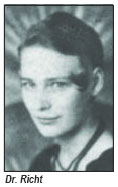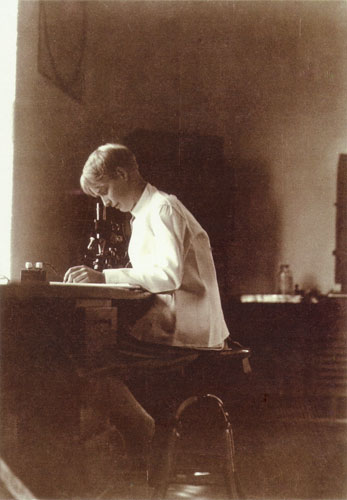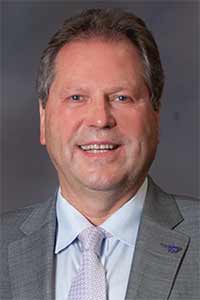Dr. Helen S. Richt Irwin, DVM 1932
Work of pioneering veterinarian a source of inspiration to CEEZAD’s/CEZID’s director
 Some of the roots of the drive to learn that motivates one researcher at the Center of Excellence For Emerging and Zoonotic Animal Diseases (CEEZAD) and Center on Emerging and Zoonotic Infectious disease (CEZID) may be traced back to a pioneer in the field of veterinary medicine.
Some of the roots of the drive to learn that motivates one researcher at the Center of Excellence For Emerging and Zoonotic Animal Diseases (CEEZAD) and Center on Emerging and Zoonotic Infectious disease (CEZID) may be traced back to a pioneer in the field of veterinary medicine.
Dr. Helen S. Richt Irwin, a long-time veterinarian and the first female graduate of Kansas State University’s College of Veterinary Medicine, was the great aunt of Dr. Juergen A. Richt, Regents and University Distinguished Professor at K-State and CEEZAD’s and CEZID’s director.
Dr. Helen Richt, who received her veterinary degree from K-State in 1932, came to the veterinary program from her home near Omaha, where she had been born in 1910. Her father ran a farm and co-operated a feedlot there.
Surrounded by animals, the young girl grew up with a love of them, especially dogs and cats. The fourth of 11 children, family members characterized her as her father’s ‘shadow’ on the farm.
In a 2005 book about female veterinary medicine graduates at K-State, Dr. Helen Richt’s sister, Edith, told author Lesley Gentry that Helen was “out-doorsy, but not a tomboy.”
That plus a family connection with Dr. Donald Munn Walker, a local veterinarian who partnered with her father in an Ag-related business, motivated the future Dr. Helen Richt to aspire to join the veterinary field. Following her graduation from high school in Omaha in 1928, she applied for admission to the K-State veterinary college.
 To that point, no woman had ever been admitted to the college, but Helen broke the precedent, entering the college in the fall of 1928. At K-State, she pursued her veterinary studies, applying such spare time as she had to activities of the Women’s Athletic Association. She enjoyed baseball, volleyball and hockey.
To that point, no woman had ever been admitted to the college, but Helen broke the precedent, entering the college in the fall of 1928. At K-State, she pursued her veterinary studies, applying such spare time as she had to activities of the Women’s Athletic Association. She enjoyed baseball, volleyball and hockey.
As a sophomore she became the first woman member of the Kansas State student chapter of the American Veterinary Medicine Association. She completed the 164-credit hour program and graduated as a DVM on June 2, 1932, in a class of 19, winning the Franklin Prize in Pathology. By then she had already passed her board exams.
Even as a student, Helen’s desire to join the veterinary profession received attention. In 1932 various newspaper articles followed her progress: her appearance before the state’s veterinary board, her receipt of a veterinary license, and her decision to launch a pet hospital.
Shortly after receiving her license, she briefly returned home to Omaha where, as it happened, her veterinary skills turned out to be needed. A family pet, a dog, injured a leg in a fence, necessitating amputation surgery. Dr. Helen Richt performed the surgery at home while family members watched. The dog recovered.
In 1933 as a grad technician, she worked at K-State alongside Dean Ralph Dykstra.
In December 1934, she married Dr. William F. Irwin, also a KSU veterinary medicine graduate with the DVM class of 1933. They jointly purchased the City Veterinary Hospital, in Tulsa in 1935. Helen specialized in tonsillectomies and caesarians. She was described as good at calming stressed animals, and capable of handling the largest dogs.
The family’s first child was born in 1937. That same year she was appointed secretary of the AVMA section on small animals. She thus became the first woman to hold an AVMA office.
The couple built a new hospital structure in 1942. By then a second son had been born; a third followed in 1945, after which Dr. Helen Richt retired from active practice to care for the couple’s family. But she maintained involvement in AVMA, serving as secretary to the Oklahoma Vet Med Association auxiliary in 1955.
Following her husband’s death in 1959 airplane accident, Dr. Helen Richt sold the Tulsa practice. Still she remained active in AVMA activities, being elected treasurer of the Oklahoma Veterinary Medicine Association in 1960.
When her health began to deteriorate, she moved back to Omaha, where she died following a prolonged battle with cancer in 1990.
Dr. Helen Richt’s career became a model for aspiring veterinarians. She once told a reporter, “it is hard work, but there is a lot of satisfaction in helping some poor dog or cat. It’s a matter of loving animals.
“I’ve always been interested in taking care of unfortunate creatures,” she added.
In her book, Gentry described Dr. Helen Richt as “a woman with great determination who was not afraid to challenge new ground…a wonderful person who has left an indelible mark on the face of women in veterinary medicine.”
In her honor, the Helen Richt Scholarship in veterinary medicine was created at K-State.
 Dr. Juergen Richt, who has been at KSU since 2008, is following in his great-aunt’s footsteps by continuing to advance veterinary research with a focus on emerging and zoonotic diseases.
Dr. Juergen Richt, who has been at KSU since 2008, is following in his great-aunt’s footsteps by continuing to advance veterinary research with a focus on emerging and zoonotic diseases.
“Although I did not know Dr. Helen Richt personally, her story, her commitment to the veterinary profession and her dedication to the advancement of veterinary science provide a great source of inspiration to me to improve the veterinary knowledge base today,” Dr. Juergen Richt said.